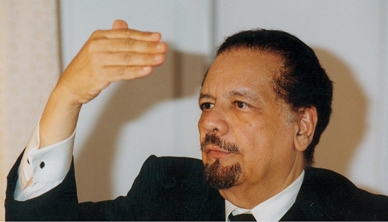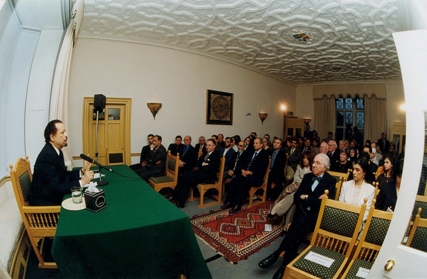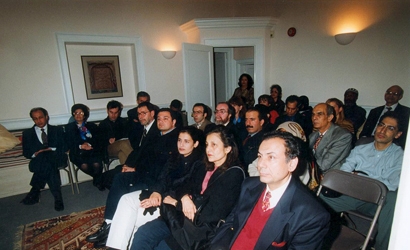A large audience of scholars, diplomats, journalists and students of Islamic culture of different nationalities and age groups attended the lecture given by the Chairman of Al-Furqan, H.E. Sheikh Yamani, on “Democracy and the Islamic Political System: Similarities and Differences” at the Foundation’s headquarters, Eagle House in Wimbledon, London, on Thursday 23rd April 1998.
After a short introduction in Arabic, Sheikh Yamani presented his lecture in English. He stated that the Holy Qur’an and the Hadith are the principal sources that embody guides for the deduction of the provisions of Islamic law (Shari’ah). He added that the practical application during the time of the Prophet and the first caliphs (Khulafa al-Rashidin) is a principal source as well. He presented the system of government in that period as a normative model of the Muslim state. The regimes that came after the era of the Prophet and the Rashidin and the developments that took place later were considered by the lecturer as subject to human fallibility and so were outside the scope of the lecture.

Sheikh Yamani focused attention on the Qur’anic verse “We have honored the sons of Adam; provided them with transport on land and sea; given them for sustenance things good and pure; and conferred on them special favours, above a great part of Our Creation” (Surat al- Isra’, verse 70). God has honoured all human beings regardless of race, religion, social class or kinship.
The Chairman also drew the attention of his audience to the verse “Those who harken to their Lord, and establish regular prayer; who (conduct) their affairs by (mutual) Consultation; who spend out of what we bestow on them for Sustenance;” (Surat al-Shura, verse 38). The Qur’an describes Islamic society as one in which people conduct their affairs by mutual consultation. Therefore, one-man rule is not acceptable in Islam.
The Chairman then explained the political system of the first Islamic state which was established in al-Madinah al-Munawwarah, referring to the text of the al-Madinah document which was drafted by the Prophet (pbuh) and came to be known as ‘al-Sahifah’. This document, he said, embodies political and social provisions as well as rules for external relations. Al-Sahifah was a Constitution establishing for the first time the concept of ‘the Nation’ in the Arabian Peninsula. Until that point, the people of the Peninsula were scattered tribes. The document stated that “the Muslims of Quraysh and Yathrib and those who followed and joined them and fought the Jihad with them are all one nation.”
Sheikh Yamani demonstrated that this was the first reference to the concept of citizenship, where an individual was seen as belonging to a state and not to a tribe. Muslims and Jews were mentioned in the document as equal citizens in the Muslim State. The Jews would have their share of the war booty if they contributed to the financing of military expeditions. The right of protection covered all citizens, provided they kept faith with the State.

The Chairman also elucidated the attributes of the Prophet: he is a messenger receiving revelations from God, an Imam (meaning a Head of State), a judge, a mujtahid (a legislator, formulating independent decisions on legal and theological matters), and a human being.
On the occasion of a pronouncement, the Prophet’s Companions would ask him,” Messenger of God, is this a revelation revealed to you, or is it a matter of opinion and shrewdness?” If he replied that it was a matter of opinion, they would in some cases discuss the matter with him, suggesting alternative courses of action. The Prophet, in most cases, followed the views of the majority.
Ali ibn Abi Talib, may God honour him, said that the Prophet was asked: ‘What is the meaning of taking a decision?’ The Prophet replied: ‘To consult men of knowledge and good judgment and then follow their advice’.
The principal of ‘Shura’ (consultation) was also put into operation by the al-Rashidin caliphs.
Sheikh Yamani also discussed the matter of the powers of the Head of State in the Islamic political system. The Head of State is a leader and not sacrosanct or a divine emissary. He derives his authority from the agreement of the Muslims. They delegate to him and vest him with authority. The Head of State has a religious function, which is to make sure that the provisions of the religion are in force. He also has a political function, which is to ensure equality and apply justice to citizens of the state, Muslims as well as non-Muslims.
Sheikh Yamani summed up Islam’s position on Human Rights in three principles:
1. Justice in every aspect of life embodying human rights and in particular the rights of women.
2. Equality among all individuals, Muslims and non-Muslims. As evidence Sheikh Yamani cited the Hadith: “Listen o Muslims! Your God is One. You are all descended from one father. No Arab is superior to a non-Arab, and no non-Arab is superior to an Arab, no red person is superior to a black person and no black person is superior to a red person, in any way other than in the fear of God”. The Prophet also said: “People are as equal as the teeth of a comb; they rival each other only by the worshipping (of God).”
3. Freedom of expression is secured in the political system of Islam.
However, Islamic political theory does not have a specific formula or mechanism for the application of democracy or Shura. This has been left to Muslims over the centuries, allowing them to run their own affairs in the manner they deem appropriate to their needs and circumstances. The Chairman proposed that this is an aspect of the excellence of the political theory of Islam. No specific political system and no particular type of legislative council have been prescribed. Prescribing a rigid formula fourteen centuries ago and assuming it would be applicable at any time and in any circumstances would have been contrary to reason.
Comparing western-style modern democracy to the political system in Islam, the Chairman concluded that the religious function of a Head of State in Islam is without parallel in the secular West. It is not permissible in a Muslim society to have secular political parties that deny the existence of God. Such secular parties are permissible in the West. Also the Shura does not allow violation of Shari’ah (Islamic law). Shura cannot allow what is unlawful nor can it prohibit what is lawful.
Islam has no rigid formula or rules for the selection of people of knowledge and good judgment and those who are able to resolve issues: ‘ahl al-hall wal-aqd’. They may be chosen by means of elections if they satisfy the legal requirements.
If the West enjoys freedom of speech, in Islam you are not merely ‘free’ to express yourself; you, in fact, have a duty to express your opinion. A person is required to express his opinion truthfully, unequivocally and without distortion. A person suppressing his true view to please someone else is denounced in the Hadith: “He who suppresses the truth is a mute devil”. Positive debate is called for in Islam. Indeed, the holy Qur’an itself is full of verses of dialogue and argument.

In the discussion after the lecture, the audience raised a number of issues. Are these principles of justice and freedom elucidated by the Chairman applicable in the contemporary Islamic world? When can such justice and freedom be enforced in Muslim societies of this day and age?
These issues, though not dealt with by Sheikh Yamani, were raised by the audience in a lively discussion continuing to a late hour. The general thrust of the audience’s comments was to attribute conditions of backwardness in parts of the Islamic world to the lack of Shura, justice, equality, and human freedom.

